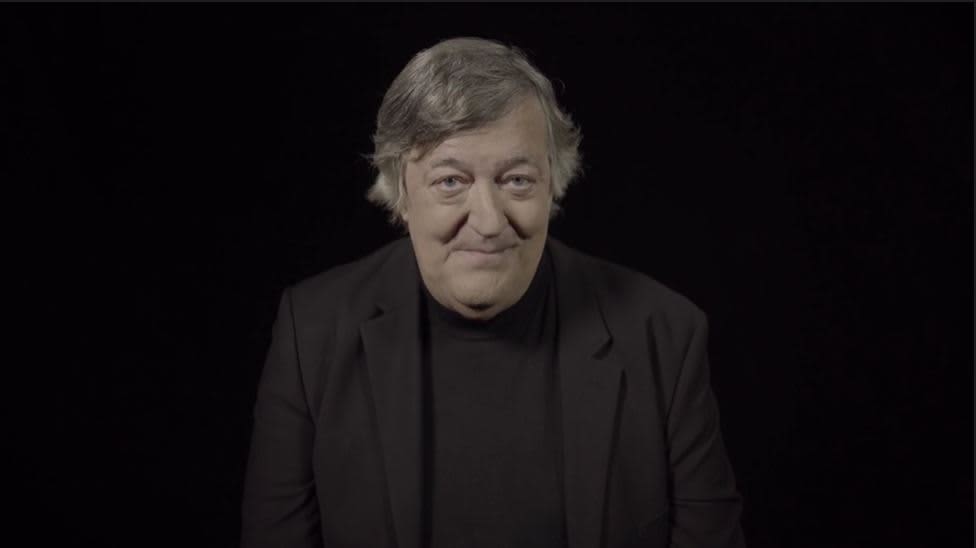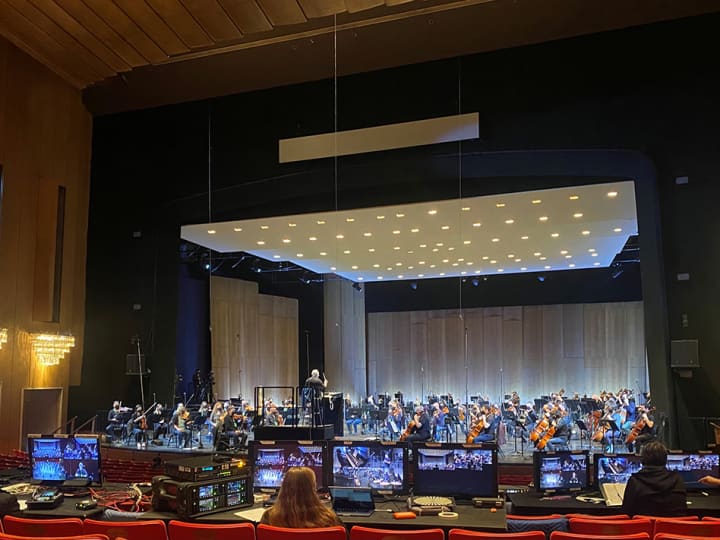Not only is he a beloved actor, he's the author of three books retelling Greek myths from the creation to the aftermath of the Trojan War. (Not to mention that he's a screenwriter, playwright, journalist, poet, comedian, television presenter, broadcaster, podcaster and film director, too.) And now he's about to become an opera star. Meet Stephen Fry, who makes his LA Opera debut as the Narrator of Oedipus Rex.
Oedipus Rex marks your LA Opera debut, but it isn’t the first time you’ve been inside the Dorothy Chandler Pavilion.
I spend a fair amount of my time when I can at my Hollywood home and have become a great admirer of LA Opera. Maestro Conlon asked if I might talk to a group of special friends, patrons and supporters of the house about the genesis of Strauss’s Salome, since I have studied (and indeed had the pleasure of playing) Oscar Wilde, on whose play the opera is of course based. This seemed to go very well and I have since done a couple a couple more events—including a talk on the Greek myth of Orpheus and Eurydice, following a performance of the Gluck opera.
What was your first experience with opera?
The first opera I ever saw was Mozart’s Don Giovanni. Now that's really starting at the top! It was the Welsh National Opera touring in the eastern provincial capital of Norwich, where I grew up. I had never been so blown away by anything on stage or screen. I couldn’t explain how something so apparently artificial could burst with such truth and vigor and real dramatic emotion. I still can’t. I, alas, have no musical talent at all so I always knew I could never involve myself professionally in that world, although I have written a libretto. But where would opera houses be without enthusiastic amateurs (in the true French meaning of that splendid word: lovers). My world was truly turned upside down and inside out however when I discovered Wagner, a passion that has taken me all over the world. We Wagnerites are like eclipse hunters or storm chasers I fear… if there’s a Ring on somewhere in the world we want to catch it. As I happily did with the Achim Freyer production here at the Dorothy Chandler pavilion.
You mentioned your post-performance talk about Orpheus and Eurydice. And now you’re back with another Greek myth for Oedipus Rex. Where does your interest in mythology stem from?
I grew up reading Robert Graves, Edith Hamilton, Nathaniel Hawthorn, Thomas Bullfinch—any collection of Greek stories I could lay my hands on. There was something about these myths that spoke to my very deeps. I knew from the earliest age that they weren’t true in the fact versus fiction sense, but I always felt that they were true in another, more profound and meaningful sense. Truer, for example, than authored fantasies that seemed similar (Middle Earth, Narnia, etc). Stories, fictions, myths, theater, ritual—these are all ways of playing out the complex mix of ambiguities, contradictions, impulses and instincts that drive and define us as humans. I still find them more revealing than religious, scientific or sociological “explanations” of who and how we are.
What can we learn from myths?
We can learn so much about the countervailing impulses that can sometimes torment us. The battle between our reason and our instincts (so well explored by Nietzsche in The Birth of Tragedy, for example). I don’t think the Greek myths are fables as such— moral lessons like Aesop or some of the fairy tales—although there are many lessons in particular on the dangers of over-reaching ourselves (like Phaeton, Bellerophon or Icarus) but in Greek myth I think it is clear that there is something glorious about such overreaching too. We strive for the sun of an unattainable perfection and we fall short (and down)—but the striving, the quest, the journey is all. “That a man’s reach should exceed his grasp, / Or what’s a heaven for?” as Browning put it.

Stephen Fry, narrator of our production of Oedipus Rex
Do you think myths are timeless?
It’s clear they are. Here we are talking about them! But I am so happy that the three books I’ve written so far, Mythos, Heroes and Troy, have appealed in particular to children. So I hope, in the countries where they’re published at least, they will last at least another generation.
Why did you include Oedipus in your book Heroes?
It’s an interesting point. Is he a hero? He was certainly made a tragic hero by Sophocles, perhaps the archetype of the tragic hero. The first half of his life, when he defeats the Sphinx, marks him as a hero of the original kind—a slayer of monsters like Atalanta, Theseus, Heracles, Perseus and Jason, clearing the world of fierce creatures to free humanity to civilize. Oedipus does it with intellect however, not brawn. It is as if myth makers and their interpreters, like the poets and playwrights, were realizing how humanity had moved from being slayers and tamers of the wild to thinkers and reasoners (the Sophocles play coincides with Karl Jaspers’ “axial age”).
The second half of his life, the tragic path to self-discovery, is more modern, and is perhaps Athens having a conversation with itself. We are compounded of blood lust, blood feuds and blood crimes, but the modern human is smart, solves puzzles, uses logic and reason and detective powers to discover more about who we are (as Aristotle and Socrates were doing)—but underneath it all, the blood crimes come out.
What makes mythology prime for opera?
Wagner wrote brilliantly about this in one of his less repugnant, bombastic or grandiose essays, the one in which he famously described the Gesamtkunstwerk, the total work of art. Aside from defining this, he made a case for mythology as a source for dramatic art—shorn as it is of modern accretions like contemporary politics and social commentary (the subject of opera since Mozart and especially the later verismo school)—as the perfect way to look at the deepest human attributes. When you watch Wotan and Brünnhilde in Die Walküre, you are watching a profound playing out of a father-daughter relationship. Stripped of baggage like class, background, ethnicity, historical context, etc., etc., it becomes all the more clear and truthful.
Can you talk a little bit about your role as the narrator in Oedipus Rex?
Librettist Jean Cocteau and then E.E. Cummings created the Narrator to allow the key dramatic elements of the story to be played out without too much clumsy expository interruption. You could do the whole Greek Chorus thing, but for a mixed genre chamber opera oratorio of this kind to cover the backstory and rather complicated unpicking of the levels and layers of narrative, a narrator was hit upon—as the script rather archly but pleasingly says—to help jog the audience’s memories of what is a tangled story!
What was it like recording your narration with COVID restrictions in place?
Fortunately, I had gotten used to the various restrictions as I’ve been lucky enough to have had plenty of time on a film set where daily testing, constant masking and monitoring are routine. Abbey Road, where we recorded, were exceptionally careful and safe. Director Matthew Diamond and Maestro Conlon were at the other end of a Zoom to help and to guide.
What can audiences look forward to in this production?
The miracle of Stravinsky’s orchestrations is always something to be marveled at, but I think especially so in this piece. The relative bareness, the stripped down nature of the dramaturgy and theatrical presentation, allows for concentration on the voices and the great moment of horror and self-realization that forms the climax.
How do you plan on watching the streaming version at home?
I shall sit myself down with a glass of something internally warming, slip on a pair of the best specially cunning earphones and immerse myself with delight.






